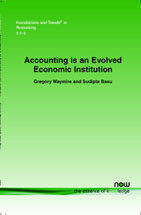Accounting is an Evolved Economic Institution
By Gregory B. Waymire, Department of Accounting, Goizueta Business School, Emory University, USA, Gregory_Waymire@bus.emory.edu | Sudipta Basu, Department of Accounting, Fox School of Business and Mangement, Temple University, USA, Sudipta.Basu@temple.edu
Abstract
We develop our paper by defining "accounting history research" and posing six big picture questions about historical accounting evolution. The paper selectively summarizes accounting history over the past ten thousand years, organized around our six questions. This review provides useful examples that we draw upon for subsequent sections, but can also be used as a US accounting history primer. We explain how accounting history can inform scholars studying modern institutions by analyzing several exemplary research papers. The paper discusses numerous empirical studies using archival accounting data and suggests further questions that can build upon and extend published research. Finally, we discuss the implications of our evolutionary perspective for accounting research, and identify numerous research opportunities under each of our six big picture questions that will together help us build a coherent evolutionary theory of accounting.
Yet, if it is too pessimistic a view that man learns nothing from history, it may well be questioned whether he always learns the truth. While the events of the past are the source of the experience of the human race, their opinions are determined not by the objective facts but by the records and interpretations to which they have access. Few men will deny that our views about the goodness or badness of di.erent institutions are largely determined by what we believe to have been their effects in the past. There is scarcely a political ideal or concept which does not involve opinions about a whole series of past events, and there are few historical memories which do not serve as a symbol of some political aim. Yet the historical beliefs which guide us in the present are not always in accord with the facts; sometimes they are even the effects rather than the cause of political beliefs. Historical myths have perhaps played nearly as great a role in shaping opinion as historical facts. Yet we can hardly hope to profit from past experience unless the facts from which we draw our conclusions are correct.
Without a knowledge of history, the accountant may not be su.ciently aware of the evolutionary nature of society.
Accounting is an Evolved Economic Institution
Accounting is an Evolved Economic Institution starts by defining "accounting history research" and posing six big picture questions about historical accounting evolution. The book summarizes accounting history over the past ten thousand years – this literature review provides useful examples for subsequent sections and can be used as a primer of accounting history. The authors explain how accounting history can inform scholars studying modern institutions by analyzing several exemplary research papers. Numerous empirical studies are examined using archival accounting data and suggest further questions that can build upon and extend published research. Finally, the authors discuss the implications of an evolutionary perspective for accounting research and identify numerous research opportunities under each of the six big picture questions to build a coherent evolutionary theory of accounting.
Accounting is an Evolved Economic Institution shows that studying the history of accounting evolution is socially valuable for several reasons. First, accounting institutional history can provide useful background knowledge and context for scholars seeking to understand modern institutions. Second, historical data provide unique opportunities to study issues of enduring importance. Third, history is the necessary focus of evolutionary theories that seek an ultimate explanation for how human societies and economic institutions are shaped over a long period of time. Fourth, a lack of historical knowledge can predispose researchers to confirmation bias. Finally, studying accounting history can help develop professional identity, not just for accounting scholars but also for accounting students.
